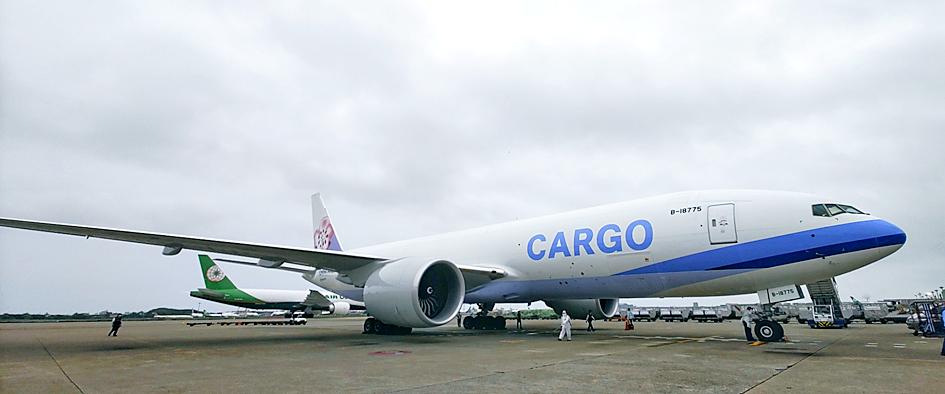China Airlines Ltd (CAL, 中華航空) yesterday reported net profit of NT$3.07 billion (US$103.25 million) for the first quarter of this year, the second-highest quarterly figure since the beginning of the pandemic given the higher margin in its cargo business, the airline said.
Earnings per share were NT$0.52, compared with losses per share of NT$0.19 a year earlier, company data showed.
With revenue growing 34 percent year-on-year to NT$37.2 billion, and operating costs rising 21 percent to NT$31.7 billion, CAL’s gross profit advanced 229 percent over the period to NT$5.49 billion last quarter, data showed.

Photo: Tony Yao, Taipei Times
That suggested a gross margin of 14.77 percent, up from 5.99 percent a year earlier, data showed.
CAL said that margin from its cargo operations continued to increase despite increases in fuel prices, thanks to high air freight fees and strong cargo demand, while its passenger operations could not recover because of border controls, data showed.
The company attributed the mild 6 percent growth in passenger revenue in the first quarter to Taiwanese returning from Australia, Europe and the US before the Lunar New Year holiday.
CAL is optimistic about the second quarter, as cargo demand is likely to hold while passenger business is expected to increase as borders reopen, adding that flights to northeast and southeast Asian markets are to be added.

SEEKING CLARITY: Washington should not adopt measures that create uncertainties for ‘existing semiconductor investments,’ TSMC said referring to its US$165 billion in the US Taiwan Semiconductor Manufacturing Co (TSMC, 台積電) told the US that any future tariffs on Taiwanese semiconductors could reduce demand for chips and derail its pledge to increase its investment in Arizona. “New import restrictions could jeopardize current US leadership in the competitive technology industry and create uncertainties for many committed semiconductor capital projects in the US, including TSMC Arizona’s significant investment plan in Phoenix,” the chipmaker wrote in a letter to the US Department of Commerce. TSMC issued the warning in response to a solicitation for comments by the department on a possible tariff on semiconductor imports by US President Donald Trump’s

The government has launched a three-pronged strategy to attract local and international talent, aiming to position Taiwan as a new global hub following Nvidia Corp’s announcement that it has chosen Taipei as the site of its Taiwan headquarters. Nvidia cofounder and CEO Jensen Huang (黃仁勳) on Monday last week announced during his keynote speech at the Computex trade show in Taipei that the Nvidia Constellation, the company’s planned Taiwan headquarters, would be located in the Beitou-Shilin Technology Park (北投士林科技園區) in Taipei. Huang’s decision to establish a base in Taiwan is “primarily due to Taiwan’s talent pool and its strength in the semiconductor

Industrial production expanded 22.31 percent annually last month to 107.51, as increases in demand for high-performance computing (HPC) and artificial intelligence (AI) applications drove demand for locally-made chips and components. The manufacturing production index climbed 23.68 percent year-on-year to 108.37, marking the 14th consecutive month of increase, the Ministry of Economic Affairs said. In the first four months of this year, industrial and manufacturing production indices expanded 14.31 percent and 15.22 percent year-on-year, ministry data showed. The growth momentum is to extend into this month, with the manufacturing production index expected to rise between 11 percent and 15.1 percent annually, Department of Statistics

An earnings report from semiconductor giant and artificial intelligence (AI) bellwether Nvidia Corp takes center stage for Wall Street this week, as stocks hit a speed bump of worries over US federal deficits driving up Treasury yields. US equities pulled back last week after a torrid rally, as investors turned their attention to tax and spending legislation poised to swell the US government’s US$36 trillion in debt. Long-dated US Treasury yields rose amid the fiscal worries, with the 30-year yield topping 5 percent and hitting its highest level since late 2023. Stocks were dealt another blow on Friday when US President Donald